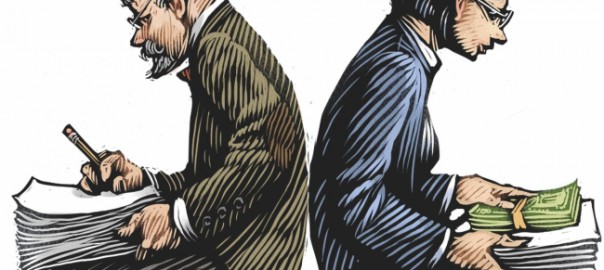July 29, 2016
When I became a professor, 20 years ago, I received a request from a woman who lived close to the Massachusetts Institute of Technology, where I taught: Could she come and talk to me about a set of interests she was developing, in the area of my own specialty in anthropology, and get my advice on applying to graduate school? We spoke for about 45 minutes in my office, at the end of which she asked, “How much do I owe you?”This woman was a therapist who billed by the hour, and she assumed that when you got the benefit of someone’s professional expertise for 45 minutes, you paid for it. Although I would expect to pay a lawyer or a therapist for a professional consultation, the idea of paying for a conversation with me seemed bizarre. I explained that professors, especially in the humanities and social sciences, get paid an annual salary and, in return, see it as part of our job to share our knowledge and to mentor others. We had a vocation, not a trade. The life of the mind is not billable.
Today I have less confidence in that answer. When I look at the work I do as an academic social scientist and the remuneration I receive, I see a pattern that makes little sense. This is especially the case with regard to publishing. If I review a book for a newspaper or evaluate a book for a university press, I get paid, but if I referee an article for a journal, I do not. If I publish a book, I get royalties. If I publish an opinion piece in the newspaper, I get a couple of hundred dollars. Once a magazine paid me $5,000 for an article.
But I get paid nothing directly for the most difficult, time-consuming writing I do: peer-reviewed academic articles. In fact a journal that owned the copyright to one of my articles made me pay $400 for permission to reprint my own writing in a book of my essays.
When I became an academic, those inconsistencies made a sort of sense: Academic journals, especially in the social sciences, were published by struggling, nonprofit university presses that could ill afford to pay for content, refereeing, or editing. It was expected that, in the vast consortium that our university system constitutes, our own university would pay our salary, and we would donate our writing and critical-reading skills to the system in return.
The system involved a huge exchange of gifted labor that produced little in the way of profit for publishers and a lot in the way of professional solidarity and interdependence for the participants. The fact that academic journals did not compensate the way commercial magazines and newspapers did only made academic publishing seem less vulgar and more valuable.
But in recent years the academic journals have largely been taken over by for-profit publishing behemoths such as Elsevier, Taylor & Francis, and Wiley-Blackwell. And quite a profit they make, too: In 2010 Elsevier reported profits of 36 percent on revenues of $3.2-billion. Last year its chief executive, Erik Engstrom, earned $4.6-million.
One reason those companies make good profits for their shareholders and pay such high salaries to their leaders is that they are in a position to charge high prices. The open-access debate has focused mainly on the exorbitant fees for-profit publishers charge libraries for bundles of journal subscriptions, but I am struck by what they charge ordinary citizens to read my individual articles.
For example, anyone without access to a university library who wants to read a nine-page article I wrote (free) for the Bulletin of Atomic Scientists last year will have to pay Sage $32 to get electronic access to it for one day—more than it would cost to buy and keep a printed copy of either of my most recent books. Needless to say, Sage passes none of the $32 on to me.
Another reason the commercial behemoths are so profitable is that their high prices are paired with the free labor of thousands of academic referees like me. Publishers can assure the quality of their products only if highly trained experts examine the articles on the academic production line and pick out the 10 percent to 20 percent that meet the highest standards for excellence. Without this free labor, the publishing companies’ entire enterprise would collapse.
When I referee an article for a journal, it usually takes three to four hours of my time. Recently, two Taylor & Francis journals asked me to review article submissions for them. In each case, I was probably one of 20 to 30 people in the world with the expert knowledge to judge whether the articles cited the relevant literature, represented it accurately, addressed important issues in the field, and made an original contribution to knowledge.
If you wanted to know whether that spot on your lung in the X-ray required an operation, whether the deed to the house you were purchasing had been recorded properly, or whether the chimney on your house was in danger of collapsing, you would be willing to pay a hefty fee to specialists who had spent many years acquiring the relevant expertise. Taylor & Francis, however, thinks I should be paid nothing for my expert judgment and for four hours of my time.
So why not try this: If academic work is to be commodified and turned into a source of profit for shareholders and for the 1 percent of the publishing world, then we should give up our archaic notions of unpaid craft labor and insist on professional compensation for our expertise, just as doctors, lawyers, and accountants do.
This does not mean we would never referee articles free. Just as the lawyer who is my neighbor bills corporate clients a hefty fee but represents prisoners in Guantánamo pro bono, so academics could referee without charge for nonprofit presses but insist on professional rates of compensation from for-profit publishers that expect us to donate our labor while paying mansion salaries to their chief executives and top managers.
We could also insist that these publishers pay a modest fee to acquire our intellectual content if they publish our articles. To prevent chaos, our professional associations could recommend standard fees for refereeing articles and for compensating authors of articles.
Corporate publishers will complain that this suggestion, if adopted, would undermine the profitability of their industry. I will leave this question to the accountants. But I do know that if a factory said it could not be profitable without paying less than minimum wage, decent people would respond that it is indecent to pay people below minimum wage for honest work.
If a for-profit business cannot prosper without demanding huge amounts of free labor, then surely the business model needs reinventing. And if enough professors refuse to referee without compensation, the reinvention will begin.
Hugh Gusterson is a professor of cultural studies and anthropology at George Mason University.


